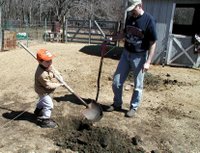it's not what you do, it's how you do it

Something that seems to be a common problem amongst parents in RDI programs is becoming too focused on finishing a task they start with the child (and I've been guilty of that myself from time to time). While you of course get your chores and projects accomplished while working with the child, it's important not to make the focus of the interaction about finishing whatever it is you're working on -- it's about working on it together.
For an example, here is a photo of The Map Man and Jacob digging a hole -- great Regulation and Master/Apprentice activity, and easily adapted to any stage work -- for stage 1, spotlight any connectedness with you; for stage 2, spotlight the child referencing you as to where to dig or where to place the shovelful of earth; for stage 3, spotlight doing the work together; for stage 4, add variations, like where to dig, how much to take, what to use to dig with, how deep to dig, what to do with the dirt, etc.
If the two of them had set out just to dig a hole, then a hole would get dug, but a lot of opportunities for interaction would be missed. For instance, when The Map Man threw a shovel full of dirt onto Jacob's shoes, which resulted in some nice emotion sharing (and a surprising turn-about when Jacob tossed some dirt at The Map Man!). Or when the two of them took turns digging out the dirt -- certainly The Map Man could get the job done more efficiently himself, but taking turns gave them a chance to work together on it. Or if they were to stop digging the hole they were working on to go work on a new hole, and yet another, then wound up alternating between 4 or 5 holes -- that certainly is not the most efficient way of digging a hole, but when working on variation, it has great value.
Oh sure, the holes got dug. But it was the stuff that went on during the process that mattered, not the end product. That's true of any RDI lifestyle activity you undertake -- it's important that you aren't trying to "get" your kid to do something -- you want to use your chores/activity as an opportunity to connect with them. So what if it takes 2 hours to sort the laundry? (In fact, at one point while working on Stage 4 variations, Jacob and I meticulously sorted socks into piles, then I threw them all into the air and scattered them about the room -- we immediately left to go outdoors for a walk, leaving socks strewn about the house!) Isn't Autism Remediation more important than getting things done quickly?
I had a friend that was fond of saying "The end product is nice, but really, the worthwhile part is the journey." She wasn't talking about (nor had she probably ever heard of) RDI, yet I couldn't agree more.

0 Comments:
Post a Comment
<< Home